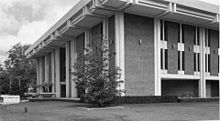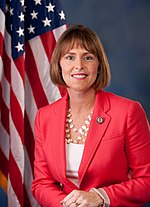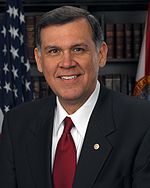Florida State University College of Law
According to Florida State University's 2016 ABA-required disclosures, 72.6% of the Class of 2015 obtained full-time, long-term, bar passage required employment (i.e., as attorneys) ten months after graduation.[5] According to those same disclosures, 81.7% of the Class of 2015 obtained full-time, long-term, bar passage required jobs or JD preferred positions within ten months of graduation.Externship programs exist in the United States and abroad — including at the International Bar Association in London, the International Criminal Tribunal for the former Yugoslavia in the Hague, the Special Court of Sierra Leone, in Washington, D.C., and in every major city in Florida, allowing students to spend a semester outside of Tallahassee.[3] According to Florida State University's official 2016 ABA-required disclosures, 72.6% of the Class of 2015 obtained full-time, long-term, bar passage required employment ten months after graduation.[5] Florida State University's Law School Transparency under-employment score is 8.3%, indicating the percentage of the Class of 2015 unemployed, pursuing an additional degree, or working in a non-professional, short-term, or part-time job nine months after graduation.One faculty member, Sandy D'Alemberte, is a former president of both the American Bar Association and the National Judicature Society.Affiliated faculty from other university departments holding courtesy appointments at the law school include John Scholz, a leading political scientist addressing regulatory enforcement; Bruce L. Benson, an economist focused and law and economics; R. Mark Isaac, a leading experimental economist; and Gary Kleck, a criminologist known for his work on guns and deterrence.

PublicTallahasseelaw schoolFlorida State UniversityTallahassee, FloridaDonald L. Tucker Centercivic centerFlorida Supreme CourtFlorida A&M UniversityVirgil D. HawkinsD'Alemberte RotundaU.S. News & World ReportJuris Doctorfirst professionallaw degreelegal writingseminarsclinicsExternshipInternational Bar AssociationLondonInternational Criminal Tribunal for the former Yugoslaviathe HagueSierra LeoneWashington, D.C.FloridasemesterMaster of LawsEnvironmental LawcertificateMaster of Studies in Lawjoint degree programsMaster of ArtsMaster of ScienceMaster of Business AdministrationLaw School TransparencySocial Science Research NetworkMark SeidenfeldWayne LoganGary KleckFrederick M. AbbottFernando TesónBruce L. BensonShawn BayernJoseph M. DodgeSandy D'AlemberteAmerican Bar AssociationJohn ScholzR. Mark IsaacFlorida State University Law Reviewlaw reviewJournal of Land Use and Environmental LawJournal of Transnational Law & PolicyFlorida State University Business ReviewKathy CastorEleanor HillC. Alan LawsonMel MartinezJohn AntoonMiddle District of FloridaJim BacchusU.S. RepresentativeWorld Trade OrganizationAppellate BodyRick BakerSt. Petersburg, FloridaKenneth B. BellTerry BowdenShannon BreamFox News ChannelcorrespondentLacey A. CollierNorthern District of FloridaBenjamin CrumpTrayvon MartinW. Thomas CumbieUnited States Air ForceColonelDwight DudleyFlorida House of RepresentativesSteven GellerFlorida SenateAdam HasnerEleanor J. HillUnited States Department of DefenseSkip HorackStanford UniversityTim HowardNortheastern UniversityMichael W. JacksonMark E. KaplanFlorida Department of TransportationTony La RussaSt. Louis CardinalsSupreme Court of FloridaEleventh Judicial Circuit Court of FloridaMarcelo LlorenteStephen MacNamaraJohn MarksU.S. SenatorSecretary of Housing and Urban DevelopmentCraig McCarthyAnne McGihonColorado House of RepresentativesInnocence ProjectGary PajcicphilanthropistRicky PolstonIon SanchoLeon County, Florida2000 presidential recountMary Stenson ScrivenJohn E. ThrasherRepublican Party of FloridaSpeaker of the Florida House of RepresentativesUnited States ArmyCarlos O. ToranoH. James ToweyAve Maria UniversityWhite House Office of Faith-Based and Community InitiativesGeorge TragosJ. Alex VillalobosJohn WoodTony LaRussaJim ToweyWayback Machine



